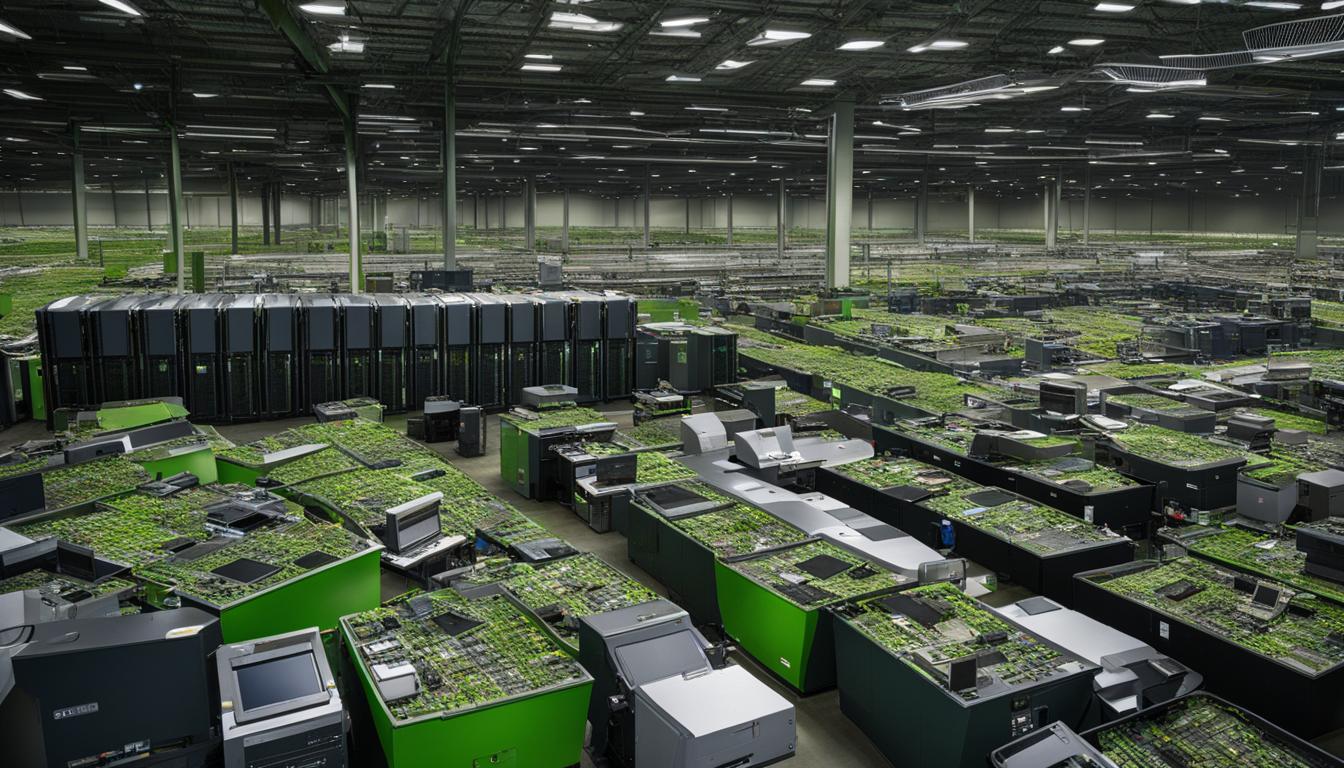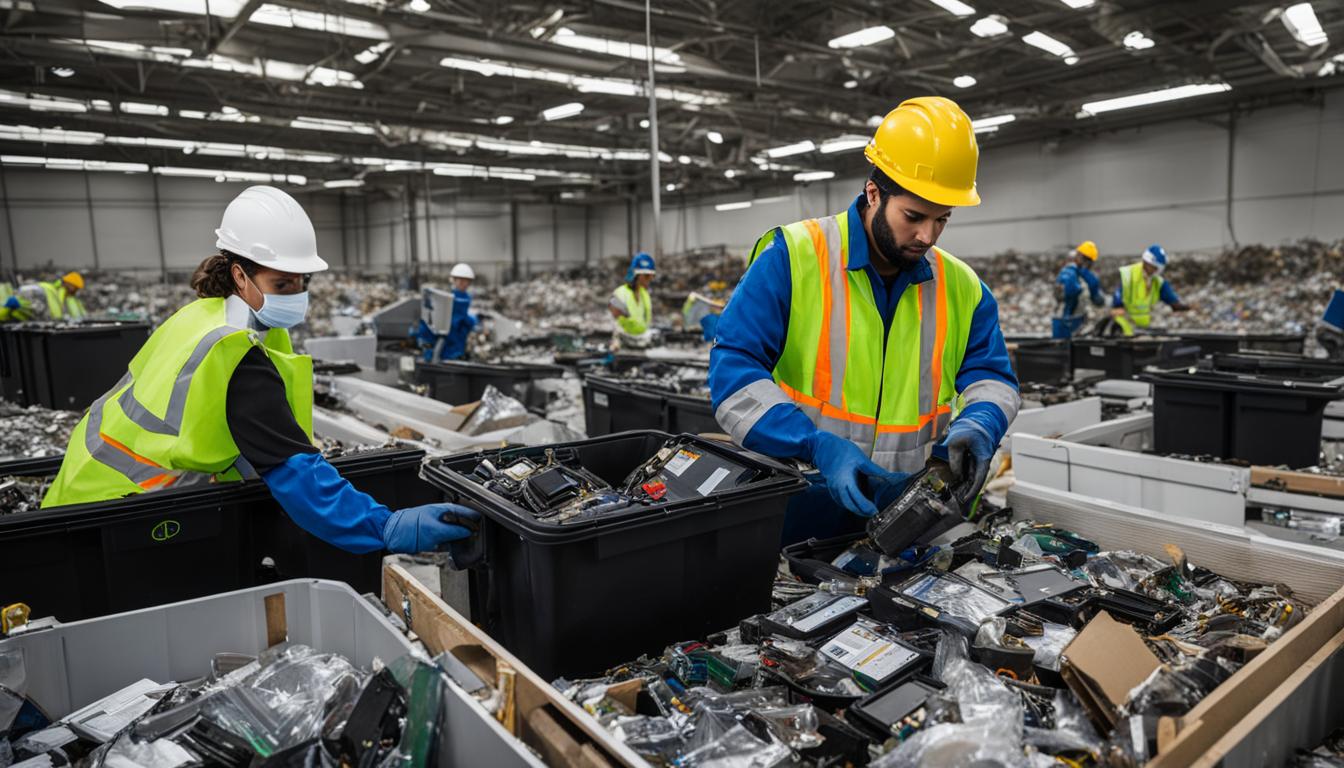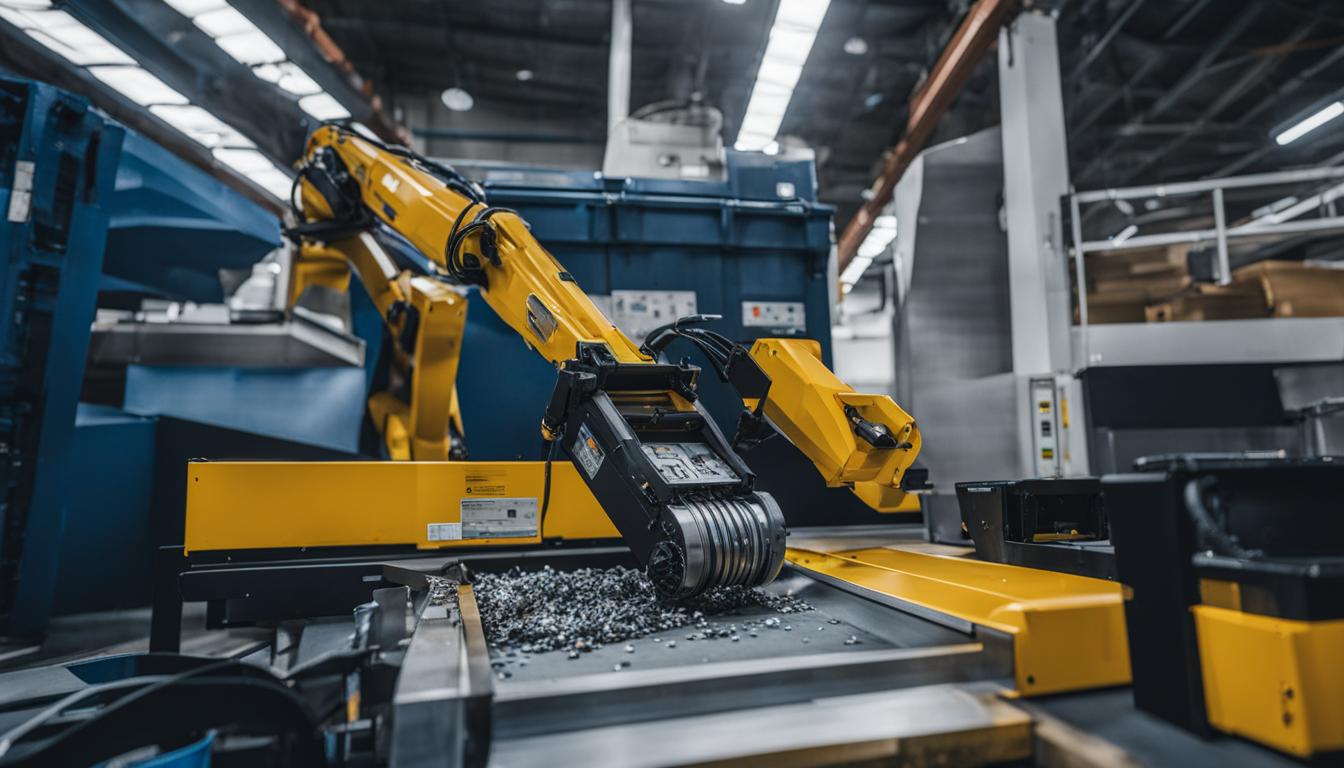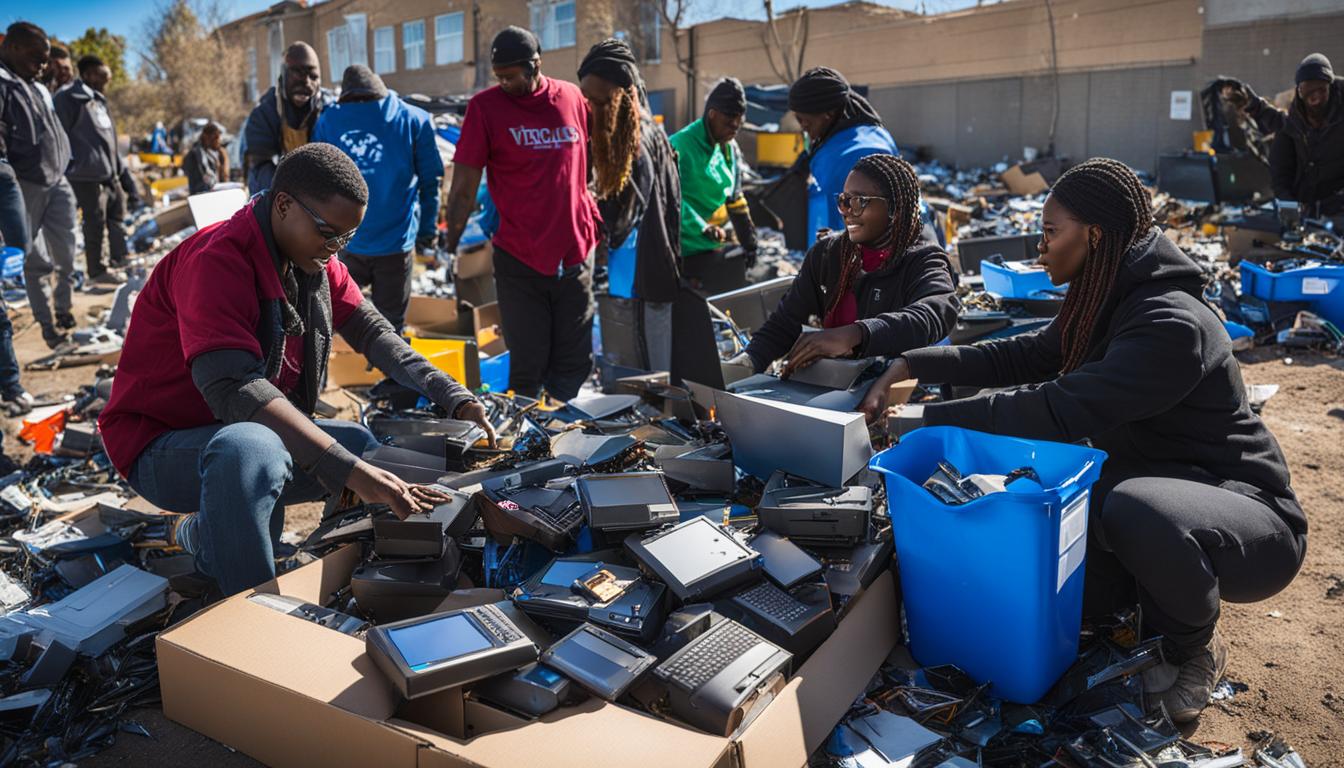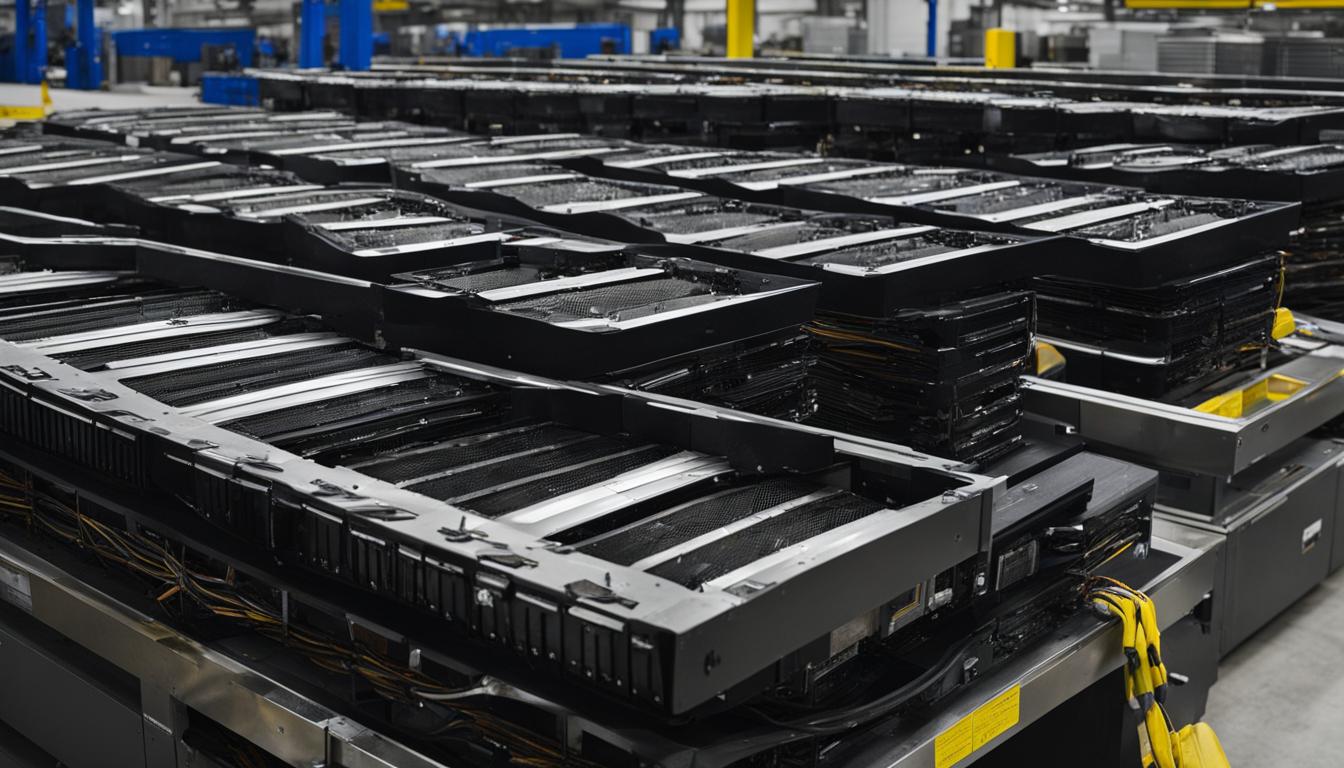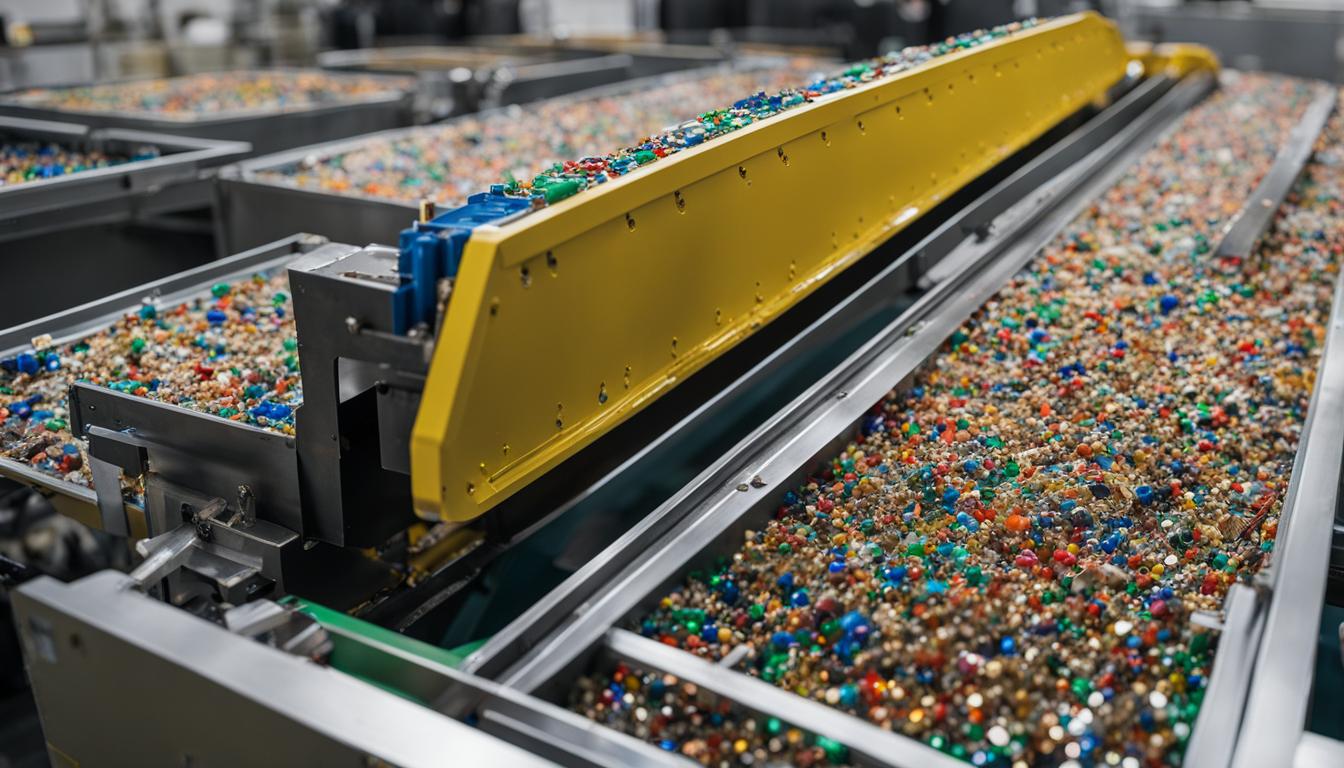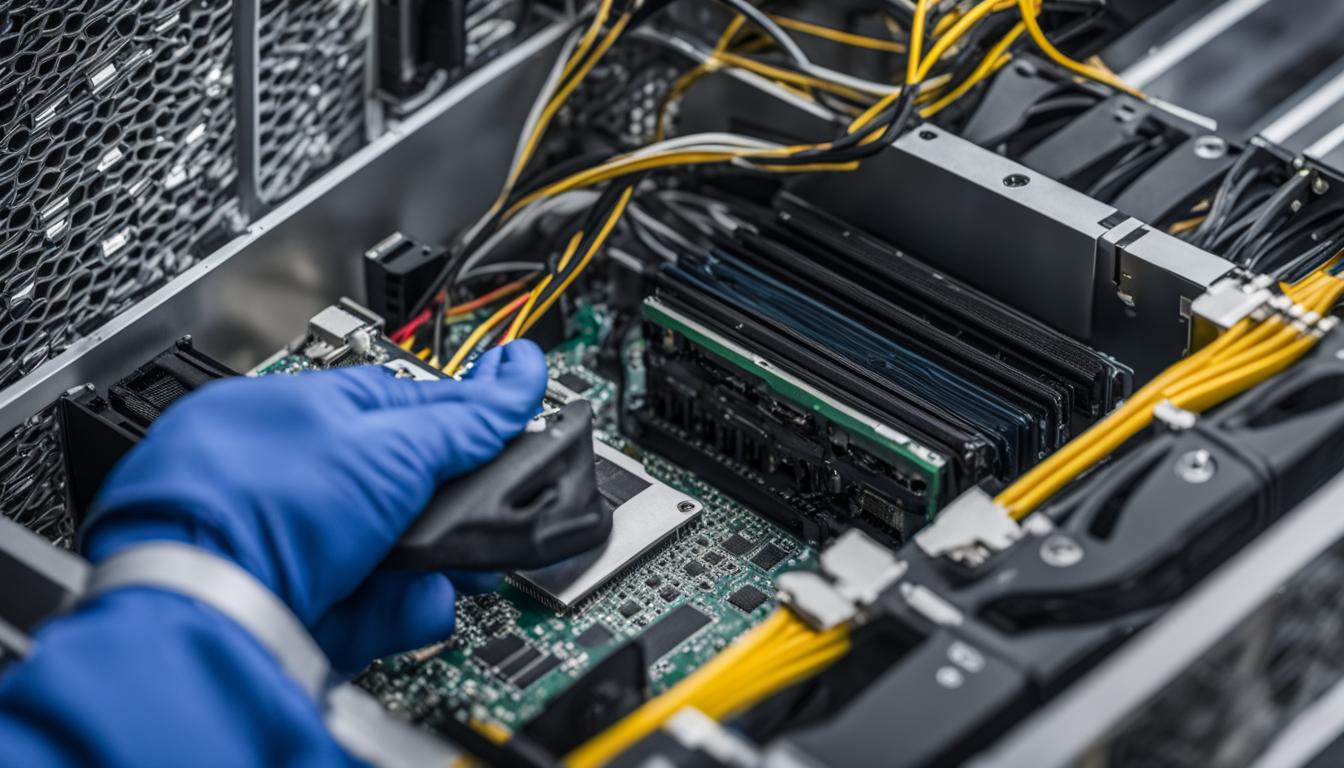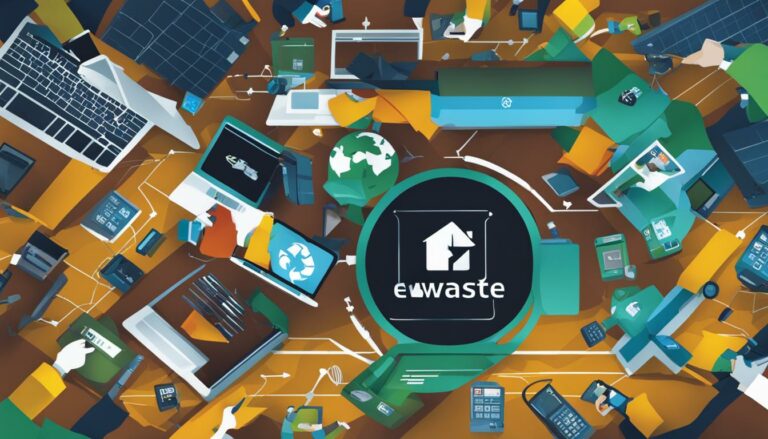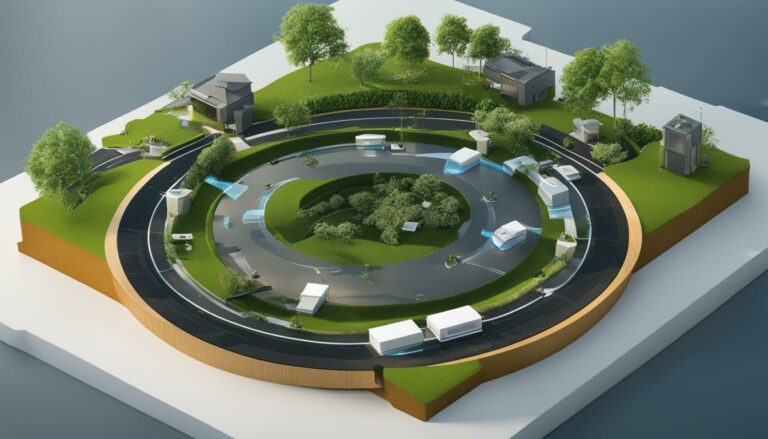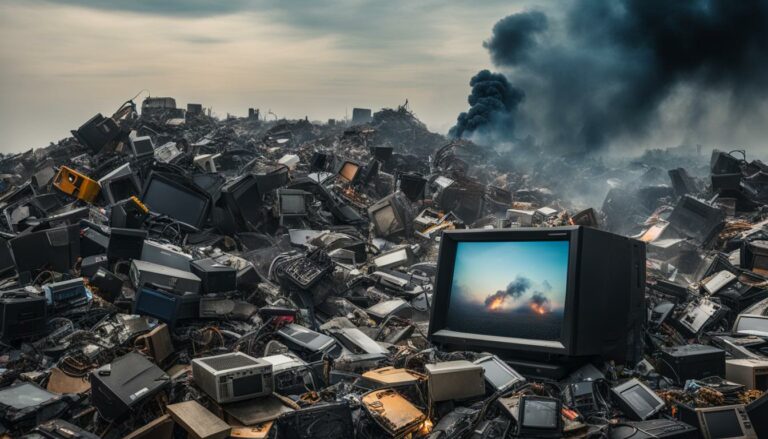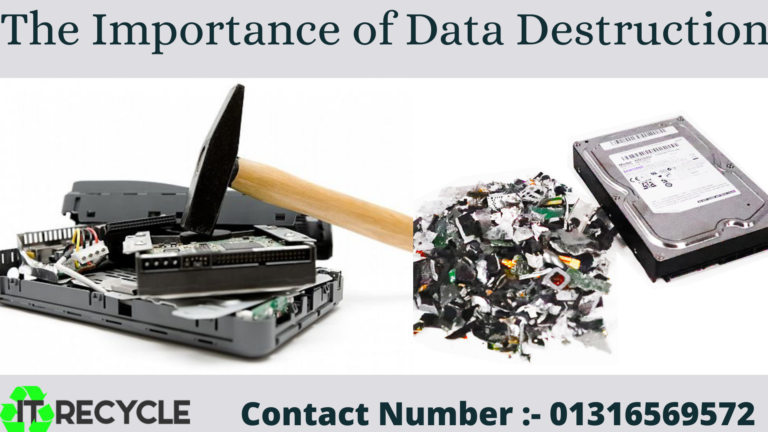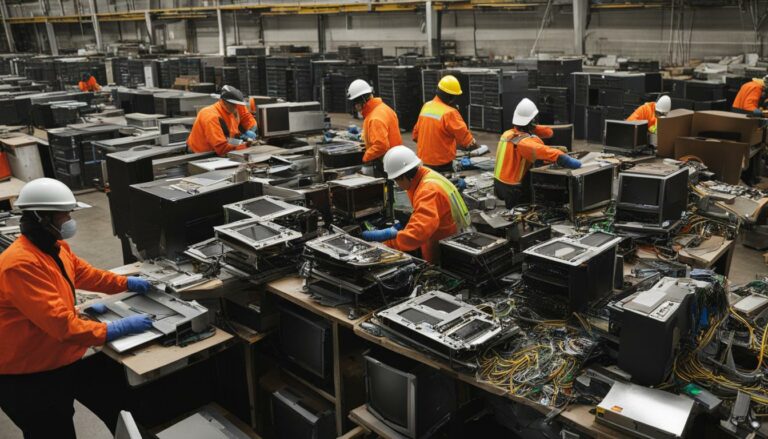From Desktops to Data Centres: IT Recycling Explored
IT recycling encompasses a wide range of electronic waste disposal and technology recycling services. From old desktops to redundant data centres, responsible IT asset disposal is essential for sustainable IT management. Green IT solutions and corporate recycling programmes aim to minimise the environmental impact of IT operations. Data destruction services and e-waste recycling centres ensure the secure and ethical disposal of IT equipment.
Key Takeaways
- IT recycling services cover various aspects, including electronic waste disposal, secure IT asset disposal, and data destruction services.
- Green IT solutions and corporate recycling programmes help reduce the environmental impact of IT operations.
- E-waste recycling centres play a vital role in ensuring the ethical and secure disposal of IT equipment.
- Responsible IT recycling is crucial for sustainable IT management and demonstrating environmental responsibility.
- Sustainable IT practices contribute to a circular economy and support corporate social responsibility goals.
The Life Cycle of Data Center Equipment
Detailed Notes: Commercial data centers have an average life cycle of 10 to 15 years, with most signing 25-year leases. During this time, data centers replace their computer hardware (IT network equipment, data storage, servers) every 3 to 5 years and refresh their infrastructure (racks, cooling, power hardware) every 8 to 10 years. This results in multiple decommissioning cycles for the equipment and infrastructure throughout the data center’s lifespan.
Data center equipment plays a crucial role in the efficient functioning of modern organizations. However, the rapid advancement of technology leads to frequent upgrades and replacement. As a result, data centers follow a structured life cycle for their hardware and infrastructure.
Typically, commercial data centers operate under long-term leases, averaging 25 years. Within this timeframe, the data center equipment undergoes multiple decommissioning cycles. Computer hardware, including IT network equipment, data storage, and servers, are typically replaced every 3 to 5 years to keep pace with technological advancements and performance demands.
Furthermore, data center infrastructure, such as racks, cooling systems, and power hardware, is refreshed every 8 to 10 years to ensure optimal efficiency and reliability. These scheduled upgrades and replacements contribute to the overall life cycle of data center equipment and infrastructure.
| Equipment | Average Replacement Period |
|---|---|
| IT Network Equipment | 3 to 5 years |
| Data Storage | 3 to 5 years |
| Servers | 3 to 5 years |
| Data Center Infrastructure (racks, cooling, power hardware) | 8 to 10 years |
These replacement cycles ensure that data centers can remain technologically up-to-date, efficient, and capable of meeting the ever-growing demands of modern businesses. By adhering to the life cycle of data center equipment, organizations can maximize their IT infrastructure’s performance while minimizing the risk of system failures and downtime.
Disposal Options for Decommissioned Data Center Hardware
When decommissioning data center hardware, there are two main options: recycling or reselling. IT Asset Disposition (ITAD) companies specialize in managing the decommissioning process, ensuring data destruction compliance and adherence to e-waste legislation. While most hardware can be resold, the safe destruction of hard drives is essential to protect sensitive data and prevent legal consequences.
Recycling decommissioned data center hardware is a sustainable and responsible choice. It minimizes environmental impact by diverting electronic waste from landfills and conserving valuable resources through the recovery of materials. ITAD companies have the expertise and infrastructure to efficiently recycle hardware, adhering to strict environmental and data destruction standards.
In cases where data security is a top priority, ITAD companies offer secure data destruction services. The process involves the complete erasure or physical destruction of data-bearing devices, ensuring that sensitive information cannot be recovered. This not only protects businesses from potential data breaches but also ensures compliance with data protection regulations.
Reselling decommissioned data center hardware can also be a viable option, especially for equipment that is still in good working condition. ITAD companies have established networks and channels to find buyers who are interested in purchasing used hardware. This allows data center operators to recoup a portion of their investment while giving the hardware a second life.
Table: Comparison of Recycling and Reselling Options
| Factors | Recycling | Reselling |
|---|---|---|
| Data Security | Secure data destruction protocols | Requires data wiping or destruction |
| Environmental Impact | Reduces electronic waste and conserves resources | Extends the lifecycle of hardware |
| Financial Return | No immediate financial return | Potential for recovering a portion of the investment |
| Ease of Disposal | Efficient disposal through ITAD companies | Requires finding suitable buyers |
Selling and Recycling Used Data Center IT Hardware
When it comes to managing decommissioned data center hardware, there are two main options to consider: selling or recycling. Both approaches have their merits, but the decision ultimately depends on the specific circumstances and objectives of the organization.
For data centers looking to recover some value from their used IT hardware, selling can be a viable option. IT Asset Disposition (ITAD) companies specialize in buying used data center hardware, even if it is broken or obsolete. The resale value of the hardware depends on factors such as its age, model type, market demand, and overall working condition. By reselling used hardware, data centers can potentially generate revenue and reduce the overall cost of hardware replacement.
On the other hand, recycling used data center IT hardware offers several benefits, particularly from an environmental perspective. Recycling adheres to R2 standards, which ensure responsible electronic waste recycling practices. By recycling hardware, data centers can reduce their environmental impact by promoting a circular economy and minimizing the need for new resource extraction. Recycling also helps to prevent the accumulation of e-waste in landfills and contributes to the conservation of valuable resources.
“Recycling used data center IT hardware offers several benefits, particularly from an environmental perspective.”
Ultimately, the choice between selling and recycling used data center IT hardware will depend on the specific needs and priorities of the organization. Considerations such as the potential resale value, the environmental impact, and the overall sustainability goals of the organization should all be taken into account. Data centers can weigh the benefits and potential drawbacks of each option and make an informed decision that aligns with their objectives and values.
| Option | Benefits | Considerations |
|---|---|---|
| Selling | – Potential revenue generation – Cost reduction – Recoup some value from used hardware |
– Market demand and pricing – Working condition of hardware |
| Recycling | – Environmental sustainability – Responsible electronic waste disposal – Adherence to R2 standards |
– Minimizing environmental impact – Reducing e-waste accumulation |
The Environmental Impact of Recycling Data Center Hardware
Recycling data center hardware is an essential practice in sustainable IT management. While the process of recycling involves energy consumption and the use of chemicals, it is still a more environmentally friendly option compared to the mining and refining of new materials. By recycling data center hardware, we can reduce the demand for raw materials and minimize the carbon footprint associated with the production of new IT equipment.
Local recycling initiatives play a crucial role in reducing the environmental impact of data center hardware disposal. By supporting local recycling facilities, we can minimize transportation emissions and promote job creation in our communities. Furthermore, legislation regarding e-waste disposal and recycling ensures that the recycling process follows strict guidelines to protect the environment and prevent hazardous substances from entering landfills or being improperly disposed of.
Recycling data center hardware is a key component of sustainable IT management, demonstrating a commitment to environmental responsibility and minimizing the negative impacts of electronic waste. It is a proactive step towards building a circular economy and reducing our dependence on finite resources.
Table: Comparative Analysis of Recycling and Mining
| Environmental Impact | Recycling | Mining |
|---|---|---|
| Energy Consumption | Lower energy consumption in the recycling process | High energy consumption in mining operations |
| Chemical Usage | Use of chemicals in the recycling process | Chemicals used in mining and refining |
| Carbon Footprint | Reduces carbon emissions by reducing the demand for new materials | High carbon emissions from mining and transportation |
By considering the environmental impact of recycling data center hardware, we can make informed decisions that prioritize sustainability. Recycling not only helps to conserve resources but also creates opportunities for job growth and contributes to a cleaner and healthier environment. It is crucial for organizations to embrace responsible recycling practices as part of their overall IT management strategy to ensure a greener future.
Benefits of Recycling Data Center Servers and Network Equipment
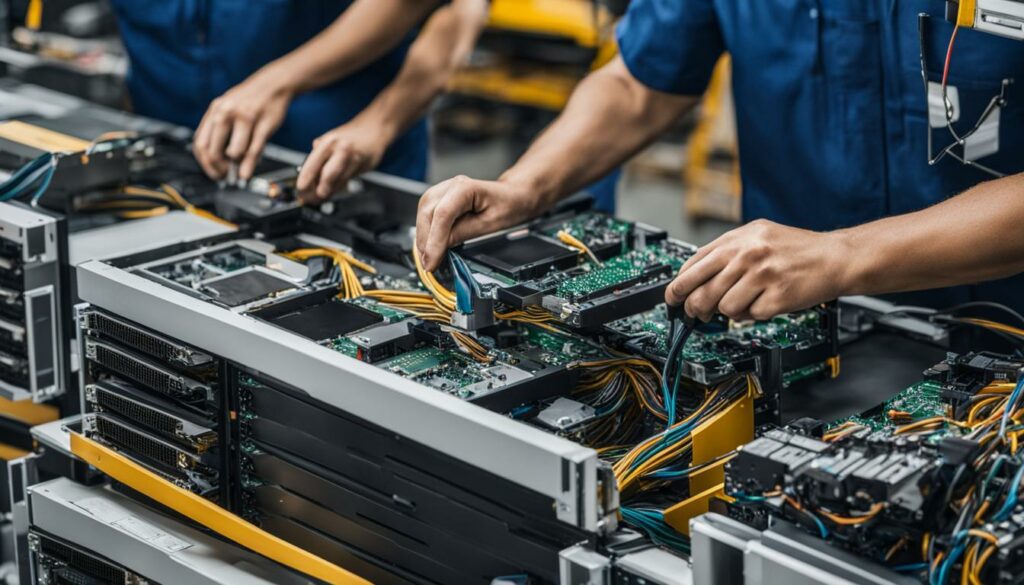
Recycling data center servers and network equipment offers numerous benefits, both for organizations and the environment. Embracing sustainable practices and supporting corporate social responsibility (CSR) policies, recycling demonstrates a commitment to ethical and responsible disposal of decommissioned IT hardware.
Recycling is a proactive step towards sustainability, allowing data centers to reduce their carbon footprint and contribute to a circular economy. By recycling servers and network equipment, organizations can mitigate the environmental impact caused by electronic waste and contribute to a greener future.
Furthermore, recycling data center hardware aligns with CSR policies and showcases an organization’s dedication to sustainable IT practices. It promotes a positive image by highlighting a commitment to environmental responsibility, which can enhance brand reputation and attract socially conscious customers and partners.
The YBC ITAD Service
When it comes to recycling data center servers and network equipment, partnering with a reliable IT Asset Disposition (ITAD) service provider like YBC is crucial. YBC offers comprehensive recycling solutions that adhere to industry standards and ensure the secure disposal of hardware and data destruction compliance.
- YBC’s recycling process follows sustainable practices, reducing the environmental impact of electronic waste and contributing to a circular economy.
- Their expertise in handling decommissioned IT hardware guarantees the safe and ethical disposal of servers and network equipment.
- Through the YBC ITAD service, data centers can effortlessly recycle their hardware, saving time and resources while aligning with sustainability goals.
In conclusion, recycling data center servers and network equipment not only benefits the environment but also supports CSR policies and enhances an organization’s reputation. By partnering with a trusted ITAD service provider like YBC, data centers can make a positive impact and contribute to a more sustainable future.
Making the Choice: Sell or Recycle Used Data Center Servers
When it comes to disposing of your used data center servers, you have a choice between selling them or recycling them. While selling may seem like a tempting option, it’s important to consider the potential environmental damage, as well as the proper destruction of hard drive data. Recycling, on the other hand, offers a more responsible and sustainable solution.
When you sell used data center servers, there is a risk of contributing to environmental damage. If the servers are sold to individuals or organizations that do not adhere to proper disposal practices, they may end up in landfills, contributing to pollution and toxic contamination. Recycling, on the other hand, ensures that the servers are properly processed, reducing their impact on the environment.
“Recycling used data center servers is not only an ethical choice but also a way to prevent further environmental damage. By choosing to recycle, you can contribute to a circular economy and reduce the demand for new resources,” says John Smith, CEO of YBC ITAD Service.
In addition to the environmental benefits, recycling also addresses the crucial issue of hard drive data destruction. Selling used servers without proper data destruction measures in place poses a significant risk in terms of data security. By recycling the servers, you can ensure that the hard drives are securely destroyed, protecting sensitive information and minimizing the potential legal consequences.
| Option | Advantages | Disadvantages |
|---|---|---|
| Selling | – Potential financial return – Immediate disposal |
– Environmental damage – Data security risk |
| Recycling | – Responsible and sustainable solution – Secure hard drive data destruction |
– No immediate financial return |
Considering the potential environmental damage, data security risks, and the overall commitment to responsible IT management, recycling used data center servers is the preferred choice. By partnering with a reputable ITAD service provider like YBC ITAD, you can ensure that your servers are recycled in a secure and environmentally friendly manner. This allows you to align with sustainability goals, reduce your carbon footprint, and demonstrate your commitment to ethical and environmentally friendly practices in the IT industry.
YBC ITAD Service: Simplifying the Recycling Process
YBC ITAD Service specializes in the secure and responsible recycling of used data center servers. With their expertise and industry-leading practices, they ensure that your servers are processed in compliance with environmental regulations. Their secure hard drive data destruction services give you peace of mind, knowing that sensitive information is permanently erased.
By choosing to recycle your used data center servers with YBC ITAD Service, you can simplify the recycling process and eliminate the hassle of disposal on your own. They handle the removal, de-manufacturing, and recycling of the servers, allowing you to focus on your core business operations while contributing to a more sustainable IT industry.
Take the proactive step towards environmental responsibility and data security by recycling your used data center servers with YBC ITAD Service. Join the growing community of organizations committed to sustainable IT practices and make a positive impact on the planet.
Conclusion
IT recycling plays a crucial role in the responsible management of electronic waste disposal. Through technology recycling services, organizations can ensure the secure disposal of their IT assets and contribute to sustainable IT management. From data destruction services to the utilization of e-waste recycling centers, responsible electronics recycling is essential for creating a greener future.
By embracing green IT solutions and implementing corporate recycling programs, businesses can minimize their environmental impact and demonstrate their commitment to responsible practices. Secure IT asset disposal is a vital aspect of IT recycling, protecting sensitive data while promoting a circular economy.
Overall, sustainable IT management requires a holistic approach that includes responsible electronics recycling. By prioritizing IT recycling scope and adopting secure IT asset disposal practices, organizations can actively contribute to reducing electronic waste and creating a more sustainable future.
FAQ
What is IT recycling?
IT recycling encompasses a wide range of electronic waste disposal and technology recycling services.
Why is responsible IT asset disposal important?
Responsible IT asset disposal is essential for sustainable IT management and minimizing the environmental impact of IT operations.
What services are offered by ITAD companies?
ITAD companies specialize in managing the decommissioning process, ensuring data destruction compliance and adherence to e-waste legislation.
Can data center hardware be resold?
Most hardware can be resold, but the safe destruction of hard drives is essential to protect sensitive data and prevent legal consequences.
What factors determine the resale value of used data center hardware?
The resale value of used hardware depends on factors such as age, model type, market value, and working condition.
What are the environmental impacts of recycling data center hardware?
Recycling data center hardware involves using energy and chemicals, but it is more environmentally friendly than mining and refining new materials.
Why is local recycling important?
Local recycling improves job creation and allows for better controls and legislation over the recycling processes.
How does recycling data center hardware support sustainability?
Recycling data center servers and network equipment is a proactive step towards sustainability and supports corporate social responsibility policies.
What are the benefits of recycling data center hardware with the YBC ITAD service?
The YBC ITAD service enables data centers to recycle their hardware effortlessly, aligning with sustainability goals and reducing their carbon footprint.
Why is responsible recycling essential for sustainable IT practices?
Responsible recycling is essential for sustainable IT practices and demonstrates a commitment to ethical and environmentally friendly practices in the IT industry.

